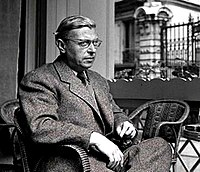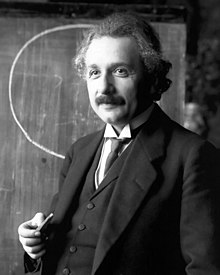User blogs

1. In his lecture Existentialism Is a Humanism (1946) Sartre described his atheistic existentialism thus:
“Dostoevsky said, ‘If God didn’t exist, everything would be possible!’ That is the very starting point of existentialism. Indeed, everything is permissible if God does not exist, and as a result man is forlorn, because neither within him nor without does he find anything to cling to. He can’t start making excuses for himself. In other words, there is no determinism, man is free, man is freedom.
On the other hand, if God does not exist, we find no values or commands to turn to which legitimize our conduct. So, in the bright realm of values, we have no excuse behind us, nor justification before us. We are alone, with no excuses.” (Sartre 1957, 22-23; see also Sartre 1988, 78).
2. “First of all, man exists, turns up, appears on the scene, and, only afterwards, defines himself. If man, as the existentialist conceives him, is indefinable, it is because at first he is nothing. Only afterward will he be something, and he himself will have made what he will be. Thus, there is no human nature, since there is no God to conceive it.” (Sartre 1957, 15-16; see also Sartre 1988, 75).
3. Nevertheless, Sartre underwent a very surprising change of mind towards the end of his life; in fact, he came very close to theistic commitment. The magazine National Review (June 11, 1982) reported it thus:
“Throughout his mature career, the philosopher Jean-Paul Sartre was a militant atheist. Politically, although he quarreled with Marxist materialism, his rhetoric was often indistinguishable from the most heavy-handed Stalinist boiler-plate.
However, during the philosopher’s last months there were some surprising developments. In 1980, nearing his death, by then blind, decrepit, but still in full possession of his faculties, Sartre came very close to belief in God, perhaps even more than very close.
The story can be told briefly, and perhaps reverently. An ex-Maoist, Pierre Victor, shared much of Sartre’s time toward the end. In the early spring of 1980 the two had a dialogue in the pages of the ultra-gauchiste Nouvel Observateur. It is sufficient to quote a single sentence from what Sartre said then to measure the degree of his acceptance of the grace of God and the creatureliness of man:
‘I do not feel that I am the product of chance, a speck of dust in the universe, but someone who was expected, prepared, prefigured. In short, a being whom only a Creator could put here; and this idea of a creating hand refers to God.’
Students of existentialism, the atheistic branch, will note that in this one sentence Sartre disavowed his entire system, his engagements, his whole life.

This is the yearly occasion to give thanks to GOD. We thank GOD for all things - from light, air, water and the food on the table to health, peace, prosperity and family! May GOD's Grace shine on mankind forever!

Top Down & Bottom Up Control of Personal & Collective Consciousness (by Iona Miller)
There is a pre-physical, unobservable domain of potentiality in quantum theory. It is the basis of fundamental interconnectedness and wholeness of Reality. The human body is not an object in space, but seamlessly welded to spacetime. We are not merely a phenomenal body of flesh, but one of awareness, of consciousness, a living interface of inner and outer field phenomena. The brain is not confined to our skull, but permeates our whole being through the intracellular matrix and sensory system, as well as the strong EM fields generated by the beating heart. Archetypes are rooted in or emerge from the holographic source field as attractors, chaotic systems having fractal or reiterative structures that repeat at all levels of observation. They never settle into equilibrium, periodicity, or resonance. Transpersonal experience creates a new interpretation, or perspective on reality. Systems arise from positive feedback and amplification. Thus, archetypes introduce erratic behavior that leads to the emergence of new situations, including creative insight.
Yet, we must have hope in a hopeless situation and try to help even if we feel helpless. So, let us pray GOD for peace in the Middle-East and urge our respective governments to broker said peace - for, GOD willing, peace is attainable even if it appears impossible.

The Possibility of Metaphysics (by Graham P. Smetham)
Although the title is ‘The Possibility of Metaphysics’ the first part has as its focus not only metaphysics in general but Buddhist metaphysics in particular. This is because the motivation for this focus issue was sparked by an email from a colleague who asked for my opinion of a book written by Robert Ellis. The aspect of the ‘experimental metaphysics’ of quantum theory is examined in detail in the first article "The Matter of Mindnature" The Buddhist metaphysical viewpoint tells as the nature of ultimate reality is best understood as a fundamentally interrelated and interpenetrating field of Mind-like energy, or Mindnature, and such a view is clearly supported by the quantum violation of Bell’s inequalities. In this article I examine Ellis’s notion of the impossibility of metaphysics in the light of both philosophical considerations and the implications of the quantum evidence. The next article "Taking the‘Meta’ Out of Physics" is Ellis’s response to my criticisms of his work. I leave it to readers to come to conclusions without further comment from me. It is my hope that there will be feedback concerning the issues raised as I am personally convinced that Ellis’s position is untenable but am curious to know whether my viewpoint is widely held. Certainly the last two articles from James Kowall, ‘What is Reality in a Holographic World?’, and Brian Whitworth, ‘Introducing The Virtual Reality Conjecture’, seem to support my position..

Hollows of Memory: From Individual Consciousness to Panexperientialism & Beyond
The question under discussion is metaphysical and truly elemental. It emerges in two aspects – how did we come to be conscious of our own existence, and, as a deeper corollary, do existence and awareness necessitate each other? I am bold enough to explore these questions and I invite you to come along; I make no claim to have discovered absolute answers. However, I do believe I have created here a compelling interpretation. You’ll have to judge for yourself.

The Role of Revelation in Science
Alexandru C. V. Ceapa suggested in his work posthumously published here that comtemorary physicists deny the role of Divine revelation in the making of modern physics and yet Einstein’s derivation of the Lorentz transformation in his 1905 paper on Special Theory of Relativity (“STR”) and his later disregarding of it were the most striking proof that revelation played an essential role in the making of STR. Ceapa’s work challenges all truth seekers to think deeply about the origin of scientific insight and creativity and examine closely the ontological basis of the pillars of modern physics, e.g., Einstein’s STR. If doing so shall assist us move “toward an exciting rebuilding of modern physics” as Ceapa hoped, he had not fought in vain and his work should not be forgotten.

How Self-Relational Consciousness Produces and Interacts with Reality
In essence, Steven E. Kaufman’s work shows how self-relational Consciousness produces and interacts with reality. But to appreciate the important work done by Kaufman, one needs to read the whole 325 pages of this Focus Issue of JCER covering his work. Our goals with this Focus Issue are: (1) bring broader awareness of Kaufman’s work by scholars and all genuine truth seekers; and (2) promote scholarly discussions of the same through commentaries and responses to commentaries in the future issues of JCER. In so doing, we hope that all of us may benefit in our endeavor to reach higher Consciousness within ourselves and build a genuine Science of Consciousness.

A Great Triumph in 21st Century Particle Physics: the Discovery of a New Particle & the Aftermath (by Huping Hu, Maoxin Wu)
On July 4, 2012, CERRN announced discovery of a new particle. Congratulations to CERN, Fermilab, people at LHC, people at Tevatron and all the theoretical and experimental physicists who made this discovery possible over the last 50 years! In the meantime, let us all be cautious and open-minded about the new discovery since there are still unsettling issues. After introductions of Higgs discovery related articles in this issue, we shall focus our attentions on some of the phobic, allergic or even hostile but important issues related to the new discovery. The topics covered includes: Antidote to 20th Century phobia; “higgson” as the name of the new particle; quantum gravity & table top experiments; higgson as the shadow of a fundamental entity; and the 2012 phenomena & and Dawn of a Brave New World. This Editorial ends with a “mathematical” poem entitled “The Real ‘God Particle’ Please Stand Up.”

1. “I want to know how God created this world. I am not interested in this or that phenomenon, in the spectrum of this or that element. I want to know His thoughts, the rest are details.” (Einstein, as cited in Ronald Clark, Einstein: The Life and Times, London, Hodder and Stoughton Ltd., 1973, 33).
2. “We are in the position of a little child entering a huge library filled with books in many different languages. The child knows someone must have written those books. It does not know how. It does not understand the languages in which they are written. The child dimly suspects a mysterious order in the arrangement of the books, but doesn’t know what it is.
That, it seems to me, is the attitude of even the most intelligent human being toward God. We see a Universe marvellously arranged and obeying certain laws, but only dimly understand these laws. Our limited minds cannot grasp the mysterious force that moves the constellations.” (Einstein, as cited in Denis Brian, Einstein: A Life, New York, John Wiley and Sons, 1996, 186).
3. “If one purges the Judaism of the Prophets and Christianity as Jesus Christ taught it of all subsequent additions, especially those of the priests, one is left with a teaching which is capable of curing all the social ills of humanity. It is the duty of every man of good will to strive steadfastly in his own little world to make this teaching of pure humanity a living force, so far as he can.” (Albert Einstein, Ideas and Opinions, New York, Bonanza Books, 1954, 184-185).
4. “After all, haven’t the differences between Jew and Christian been overexaggerated by fanatics on both sides? We both are living under God’s approval, and nurture almost identical spiritual capacities. Jew or Gentile, bond or free, all are God’s own.” (Einstein, as cited in H.G. Garbedian, Albert Einstein: Maker of Universes, New York, Funk and Wagnalls Co., 1939, 267).
5. “Every one who is seriously involved in the pursuit of science becomes convinced that a Spirit is manifest in the laws of the universe – a Spirit vastly superior to that of man, and one in the face of which we with our modest powers must feel humble. In this way the pursuit of science leads to a religious feeling of a special sort, which is indeed quite different from the religiosity of someone more naive.” (Einstein 1936, as cited in Dukas and Hoffmann, Albert Einstein: The Human Side, Princeton University Press, 1979, 33).
6. “The deeper one penetrates into nature’s secrets, the greater becomes one’s respect for God.” (Einstein, as cited in Brian 1996, 119).
7. “The most beautiful and most profound emotion we can experience is the sensation of the mystical. It is the sower of all true science. He to whom this emotion is a stranger, who can no longer stand rapt in awe, is as good as dead. That deeply emotional conviction of the presence of a superior Reasoning Power, which is revealed in the incomprehensible Universe, forms my idea of God.” (Einstein, as cited in Libby Anfinsen 1995).
8. “My religiosity consists in a humble admiration of the infinitely superior Spirit that reveals itself in the little that we, with our weak and transitory understanding, can comprehend of reality.” (Einstein 1936, as cited in Dukas and Hoffmann 1979, 66).
9. “The more I study science the more I believe in God.” (Einstein, as cited in Holt 1997).
10. Max Jammer (Professor Emeritus of Physics and author of the biographical book Einstein and Religion, 2002) claims that Einstein’s well-known dictum, “Science without religion is lame, religion without science is blind” can serve as an epitome and quintessence of Einstein’s religious philosophy. (Jammer 2002; Einstein 1967, 30).
11. “The highest principles for our aspirations and judgments are given to us in the Jewish-Christian religious tradition. It is a very high goal which, with our weak powers, we can reach only very inadequately, but which gives a sure foundation to our aspirations and valuations.” (Albert Einstein, Out of My Later Years, New Jersey, Littlefield, Adams and Co., 1967, 27).
12. “In view of such harmony in the cosmos which I, with my limited human mind, am able to recognize, there are yet people who say there is no God. But what really makes me angry is that they quote me for the support of such views.” (Einstein, as cited in Clark 1973, 400; and Jammer 2002, 97).
13. Concerning the fanatical atheists Einstein pointed out:
“Then there are the fanatical atheists whose intolerance is of the same kind as the intolerance of the religious fanatics and comes from the same source. They are like slaves who are still feeling the weight of their chains which they have thrown off after hard struggle. They are creatures who – in their grudge against the traditional ‘opium for the people’ – cannot bear the music of the spheres. The Wonder of nature does not become smaller because one cannot measure it by the standards of human moral and human aims.” (Einstein, as cited in Max Jammer, Einstein and Religion: Physics and Theology, Princeton University Press, 2002, 97).
14. “True religion is real living – living with all one’s soul, with all one’s goodness and righteousness” (Einstein, as cited in Garbedian 1939, 267).
15. “Certain it is that a conviction, akin to religious feeling, of the rationality or intelligibility of the world lies behind all scientific work of a higher order.
… This firm belief, a belief bound up with deep feeling, in a superior Mind that reveals itself in the world of experience, represents my conception of God.” (Einstein 1973, 255).
16. “Strenuous intellectual work and the study of God’s Nature are the angels that will lead me through all the troubles of this life with consolation, strength, and uncompromising rigor.” (Einstein, as cited in Calaprice 2000, ch. 1).
17. Einstein’s attitude towards Jesus Christ was expressed in an interview, which the great scientist gave to the American magazine The Saturday Evening Post (26 October 1929):
“- To what extent are you influenced by Christianity?
- As a child I received instruction both in the Bible and in the Talmud. I am a Jew, but I am enthralled by the luminous figure of the Nazarene.
- Have you read Emil Ludwig’s book on Jesus?
- Emil Ludwig’s Jesus is shallow. Jesus is too colossal for the pen of phrasemongers, however artful. No man can dispose of Christianity with a bon mot.
- You accept the historical Jesus?
- Unquestionably! No one can read the Gospels without feeling the actual presence of Jesus. His personality pulsates in every word. No myth is filled with such life.” (Einstein, as cited in Viereck 1929; see also Einstein, as cited in the German magazine Geisteskampf der Gegenwart, Guetersloh, 1930, S. 235).
